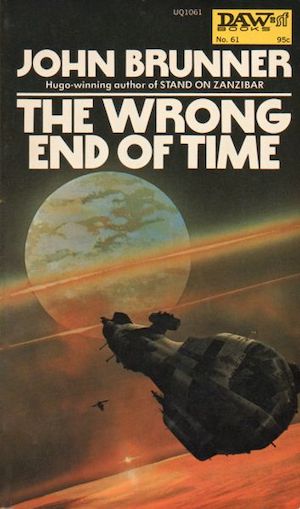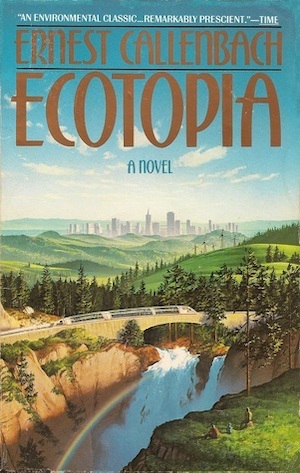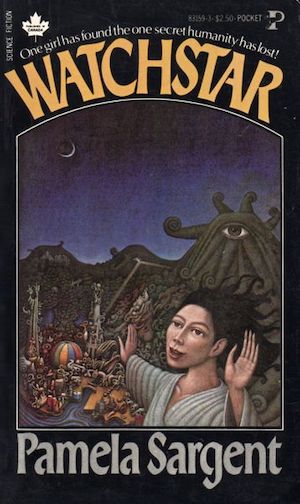Noted philosophers Edward and Tulip “Tubbs” Tattsyrup, featured in the documentary The League of Gentlemen, have pondered the problems inherent in contact with the outside world. Outsiders follow unfamiliar ways. Outsiders ask uncomfortable questions. Outsiders are impudently judgmental about long-established custom. Shop owners Edward and Tubbs reject undue contact with the unfamiliar, rebuking new customers with shrieks of “This is a local shop, for local people; there’s nothing for you here!”
Many cultures have followed the same chain of logic as the Tattsyrups, closing their borders to disruptive outside elements. Here are five works about communities that try their very best to apply the rules of “local shops for local people,” however misguided.
The Wrong End of Time by John Brunner (1971)

Confronted by potential enemies external and internal, the America of tomorrow took forthright action. Americans are secure, knowing that American borders are protected by the world’s most perfect defense system. Americans themselves are subjected to relentless scrutiny. Those unwilling or unable to conform are whisked away to facilities where they will be encouraged to contemplate their errors.
Vassily Sheklov infiltrates Fortress America not because he yearns to be American (he doesn’t) or because he’s a sneaky communist (although he is). The world has received extra-terrestrial messages suggesting the destruction of human civilization is imminent. Paranoid, heavily armed America may play a central role in foiling or confirming the alien prediction. It falls to Vassily to forestall doomsday.
Interestingly, Brunner’s novel foreshadows certain real-world events. Although largely off-stage, the narrative observes that like Fortress America, the UK has isolated Britain and cut off all contact with the outside world. As it turns out, isolationist nations that can draw on a third of a continent are faring better than hermit kingdoms limited to one dinky island.
Ecotopia by Ernest Callenbach (1975)

Ecotopia seceded from the United States of America in 1979, establishing a new nation along the former American West coast. Governed according to strict ecological guidelines, the Ecotopians reject wasteful consumer society. Safe behind secure borders, the Ecotopians go their own way, leaving foolish America to empty dreams of prosperity.
Twenty years after independence, journalist William Weston is granted rare admittance to Ecotopia. His covert mission is to see if the Ecotopians can be convinced to rejoin the USA. The flaw in the plan? The Ecotopian way of life is so seductive that to be exposed to it is to be converted to the one correct ethos almost immediately. Rather than seducing Ecotopia for America, Weston will himself be seduced.
Many utopias rely on the persuasive power of their ideology to convert foreigners. Ecotopia is an interesting exception. Ecotopia does have the usual enthusiasts chattering on about the benefits of their way of life as earnestly as a Canadian explaining single-payer healthcare to an American who just wanted directions to the nearest Starbucks. Ecotopia also has secret police who monitor and interrogate said foreigners as subtly as the KGB descending on a dissident in the dark of night. Conveniently for the positive portrayal of Ecotopia, Weston is weirdly enthusiastic about his visit from the secret police.
Watchstar by Pamela Sargent (1980)

If questioned, Daiya AnraBrun’s people would not describe themselves as isolationist, as they know of no outside from which to isolate themselves. However, while the villages of Earth tend to keep themselves to themselves, travel wouldn’t expose anyone to novelty. All the villages follow more or less the same customs. It could hardly be otherwise, for to deviate from the one true way is to perish. Indeed, even following the correct path will only moderately improve one’s chance of survival. This is a matter of concern for Daiya, who faces a rite of passage likely to kill her.
Daiya’s people’s horizons are insufficiently broad. Reiho’s people follow ways alien to Daiya’s … in space, far from the ken of Terrestrials. Now some of Reiho’s people have returned to Earth. Reiho and Daiya meet. Daiya’s worldview is broadened immeasurably—which in the eyes of her people makes Daiya an abomination to be eliminated as quickly as possible.
On the plus side, Daiya’s community commands impressive psionic powers, such as telekinesis and telepathy. On the minus side, they don’t really understand said powers, being incurious about the true source of their ability. Also on the minus side, if you think rural communities can be relentlessly conformist, just add telepathy to the mix.
A Psalm for the Wild-Built by Becky Chambers (2021)

Centuries earlier, the Factory Age ground to an abrupt halt. Robots suddenly and inexplicably became self-aware. The thinking machines decamped en masse to their own territory. Since then, there has been no contact between humans and their former servants.
Tea monk Dex is determined to listen to crickets. There being no crickets near the City, Sibling Dex must by necessity venture into the wilderness … a part of the wilderness close to the robot enclave. Dex does not intend to contact the thinking machines. Nevertheless, Dex inadvertently becomes humanity’s ambassador to their lost creations.
The robots’ backstory has parallels with the backstory of Battlestar Galactica’s Cylons. Unlike Cylons, the wild-built bear no resentment towards humans and utterly reject violence. English lacks the words to convey how relentless amiable the resulting novella is. It makes Clifford Simak read like David Drake.
Land of Milk and Honey by C Pam Zhang (2023)

A toxic smog inexorably spread across North America and the world, blighting crops in its path. Faced with food shortages, the US resorted to ethnic cleansing, ejecting anyone who did not meet narrow racial standards. In theory, persons like the novel’s unnamed Asian American chef protagonist can earn their way back in. In practice, best not to count on it.
The chef has the right background, skills, and relaxed views about the truth to earn herself a role in a visionary oligarch’s plan to save humanity. Ensconced in the oligarch’s Italian mountain retreat, the chef discovers the catch. The grand plan requires time to reach fruition. Starving Italy is just as xenophobic as America and an isolated enclave of the superrich is an ideal target for the mob’s anger.
In the angry mob’s defense, it’s not at all clear that the oligarch’s grand plan can work. In fact, the evidence suggests that it probably cannot. However, the self-serving racism on prominent display across the planet also won’t save humanity.
***
These are just a few of the SFF works about hermit kingdoms, sealed republics, and local shops for local people. Perhaps I missed your favourite examples. If so, feel free to mention them in comments below.
In the words of fanfiction author Musty181, four-time Hugo finalist, prolific book reviewer, and perennial Darwin Award nominee James Davis Nicoll “looks like a default mii with glasses.” His work has appeared in Interzone, Publishers Weekly and Romantic Times as well as on his own websites, James Nicoll Reviews (where he is assisted by editor Karen Lofstrom and web person Adrienne L. Travis) and the 2021, 2022, and 2023 Aurora Award finalist Young People Read Old SFF (where he is assisted by web person Adrienne L. Travis). His Patreon can be found here.










